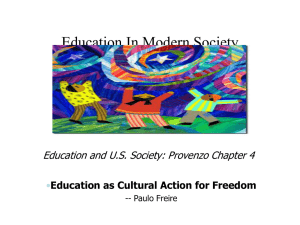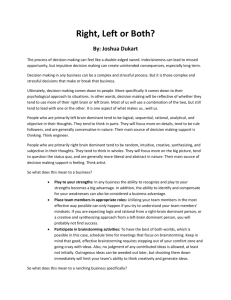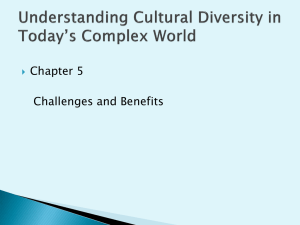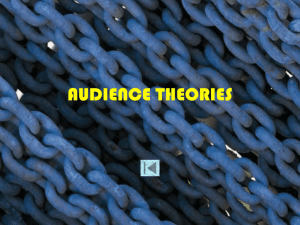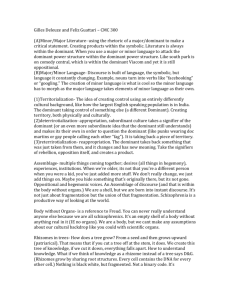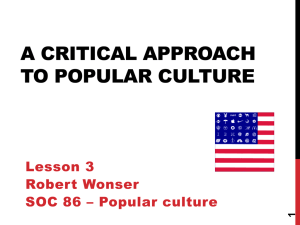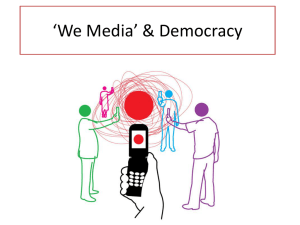Birmingham School of Cultural Studies: Hegemony & Resistance
advertisement
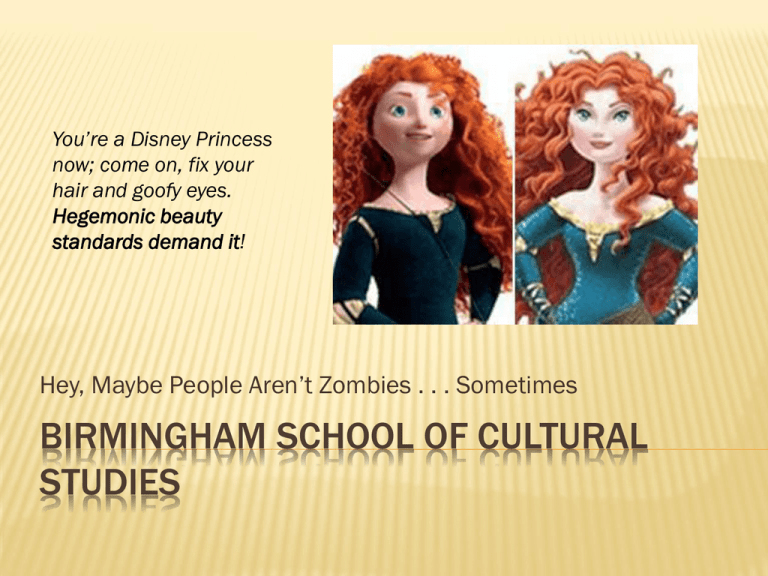
You’re a Disney Princess now; come on, fix your hair and goofy eyes. Hegemonic beauty standards demand it! Hey, Maybe People Aren’t Zombies . . . Sometimes BIRMINGHAM SCHOOL OF CULTURAL STUDIES BEGINNINGS Founded in 1964 at the University of Birmingham by Richard Hoggart Was a politically committed school with politics committed to the “New Left” valuing democracy, equality, and liberation Like the Frankfurts, were formed out of their own historical crisis; this time the post war politics of England CHANGES Moved from literary/moral theory of culture (seen in Arnold and Frankfurts) to an anthropological view– i.e., how do people make meaning from cultural messages Dropped emphasis on high/low culture to look at the process of how all texts are produced, disseminated, and interpreted All people are born with the potential to be an intellectual (both consumer and producer) Popular texts are the most important texts to look at precisely because of the power they hold GOALS Sought ideological critique, like the Frankfurts, but moved away from the perpetuation of capitalism and consumption to a more give and take process Returned to earlier works of Antonio Gramsci for foundation- specifically thoughts on hegemony that questioned the solely top-down influence the Frankfurts gave to commodity culture To educate and liberate people from the dominant messages of pop culture– foster resistance and critical awareness STUART HALL ON BHAM DIFFERENCES “We broke with the models of 'direct influence' using a sort of stimulus-response model with heavily behaviorist overtones, media content serving as a trigger- into a framework which drew much more on what can broadly be defined as the 'ideological' role of the media. Secondly, the school broke with the passive and undifferentiated conceptions of the 'audience' as it has largely appeared in traditional research, replacing them with how media messages were encoded, the 'moment' of the encoded text and the variation of audience decodings” – Stuart Hall IN THE SHORTEST OF SHORT While Frankfurts focused solely on the capitalistic and consumer affects of pop culture en masse (cause the content was too bland to be relevant), the Birmingham school focused on the potential messages and meanings of individual pop culture texts (they turned to content) to understand their effects on people. SEMIOTICS Understands language and images as symbolic sign systems where absolute or guaranteed meaning cannot be housed in the thing itself Connotation Changing Definitions over time, place, cultures Polysemousness SO WE’RE USED TO THIS The Birmingham school essentially adopted the techniques of literary criticism (especially New Criticism) and applied them to popular culture These textual effects were fundamental for exploration because of pop culture’s prevalence in people’s lives HEGEMONY “Cultural Hegemony describes the domination of a culturally diverse society by the ruling class, who manipulate the culture of the society — the beliefs, explanations, perceptions, values, and mores — so that their ruling-class worldview becomes the worldview that is imposed and accepted as the cultural norm; as the universally valid dominant ideology that justifies the social, political, and economic status quo as natural, inevitable, perpetual and beneficial for everyone, rather than as artificial social constructs that benefit only the ruling class” – from good ol’ Wikipedia LIBERATION From society’s dominant codes about gender roles LIBERATION From society’s dominant codes about race and racial/cultural appropriation LIBERATION “"We have got this tailspin of culture in our inner cities in particular of men not working, and just generations of men not even thinking about working, and not learning the value and the culture of work. So there's a real culture problem here that has to be dealt with.“ From society’s dominant codes about class and racial connections. RESISTANCE • Fetishized the notion of resistance- i.e., oppositional reads, going against society’s dominant codes (we’ll see this in Hepdige) • Believed that only through education and close reading could people be trained to resist the dominant codes • Unlike Frankfurts, believed this was possible– to get outside of the system and peer back it at critically TITLES Blood, Biceps, and Beautiful Eyes: Cultural Representations of Masculinity in Masami Kurumada's Saint Seiya Popular Culture, Ideology, and the Comics Industry: Steve Ditko's Objectivist Spider-Man Beyond the Alternative vs. Mainstream Dichotomy: Olympic BMX and the Future of Action Sports Faith and Bad Faith in Do Androids Dream of Electric Sheep? Revising (the) Resistance: American Guerrillas in Popular Film and Television “Between Light and Nowhere”: The Queer Politics of Nostalgia

